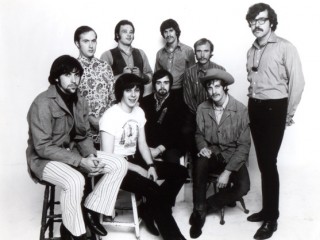
Blood, Sweat And Tears biography
Date of birth : -
Date of death : -
Birthplace : New York City, New York, U.S.
Nationality : American
Category : Arts and Entertainment
Last modified : 2012-04-12
Credited as : Music group, jazz-rock style, Brand New Day album
0 votes so far
In 1967 veteran musician Al Kooper began to assemble Blood, Sweat and Tears, the large blues/jazz rock band that had occupied his imagination for many years. A former member of the 1950s pop group the Royal Teens ("Short Shorts"), session musician for Bob Dylan, and member of New York City's Blues Project, Kooper wanted to expand the scope of rock to include the more polite forms of jazz and, simultaneously, to bring jazz to a larger and more general audience.
Envisioning a jazz-rock fusion, Kooper recruited musicians with strong jazz and rock backgrounds for his eight-ten member band: guitarist Steve Katz, for instance, was another Blues Project member; drummer Bobby Colomby played for folk-blues singer Odetta; bass player Jim Fielder worked with the Mothers of Invention and Buffalo Springfield; and the group's unusually large horn section (two trumpeters, two trombonists, and a saxophonist) hailed from New York jazz and studio bands.
Blood, Sweat and Tears launched its innovative sound with the album Child Is Father to the Man, reinventing the songs of Harry Nilsson, Randy Newman, Carole King, and others through the heavy use of brass and jazz. Recognized as a milestone in rock music, the album nonetheless fell short of commensurate commercial success. Kooper decided to leave the band in favor of record producing (two other members left as well), and many feared the group would fold before it had a chance to get off the ground. Leadership fell to Katz and Colomby; new musicians joined the ranks, and this time the public proved ready for the new ensemble.
When Kooper left Blood, Sweat and Tears Canadian rock star David Clayton-Thomas became the band's lead singer--his powerful rasping vocals soon became identified with the group and its subsequent commercial success. With Clayton-Thomas, the 1969 album Blood, Sweat and Tears became a blockbuster hit, the number one LP for seven straight weeks. Introducing three gold singles, the Grammy-winning album remained on the charts for more than two years. The album featured big band jazz-rock arrangements of old and new songs by such artists as Brenda Holloway, Billie Holiday, Laura Nyro, and Steve Winwood; the three cuts "Spinning Wheel," "And When I Die," and "You've Made Me So Very Happy" climbed to the top of the charts.
Blood, Sweat and Tears 3, appearing a year later, was nearly as successful, introducing the hit singles "Hi-De-Ho" and "Lucretia MacEvil." At the height of its popularity, the band was enlisted by the U.S. State Department for a 1969 goodwill tour of Yugoslavia, Romania, and Poland. The band's acclaim was short-lived, however; the 1971 single "Go Down Gamblin'" proved to be the group's last big hit. Other horn rock bands had sprung up by then: Chase, the Ides of March, and the highly regarded and commercially successful Chicago Transit Authority (later renamed Chicago).
Beset by internal dissent and frequent personnel changes, Blood, Sweat and Tears was dealt a serious blow when Clayton-Thomas left in 1972 to pursue a solo career; engaging a succession of lead singers, the band enjoyed a brief return of popularity when Clayton-Thomas rejoined in 1974. Others pointed to Blood, Sweat and Tears's commercialism as a reason for its steady decline: the group rarely engaged in the improvisation so integral to jazz (duplicating recordings note for note in concert), and many questioned the earnestness of its jazz-rock experiment.
Becoming a regular act in Las Vegas, the band was charged with being hollow and pretentious, swapping its original rock audience for older, cabaret-oriented listeners, abandoning--according to The Illustrated Encyclopedia of Rock-- "the very road of rock it set out to re-surface." Still, fans of the group defended its right to evolve, deeming its brassy commercial style worthwhile. Yet others acknowledged that before Blood, Sweat and Tears fell away from Kooper's original vision it was the best of the jazz-rock bands and that it was owed a debt of gratitude for the musical possibilities it opened to those who came after.
Since late 2005, The band has been touring world wide with a refeshed line up. 2011 saw BS&T and Chicago co-headlining a Jazz festival in Stuttgart Germany. All of the band's albums, with the exception of Brand New Day, are currently available on compact disc. BS&T's first four albums were reissued by Sony Records in remastered editions (typically with bonus material), except for its third album, which has been reissued by Mobile Fidelity. The later Columbia albums have been reissued by Wounded Bird Records, and Rhino Records has reissued Nuclear Blues. Brand New Day was issued on CD in Russia in 2002, although the disc may not have received authorization from copyright holders.
Albums:
-Child Is Father to the Man (1968) Producer: John Simon (RIAA: Gold)
-Blood, Sweat & Tears (1968) Producer: James William Guercio, 1970 Grammy Award for Album of the Year. (RIAA: 4 x Multi-Platinum)
-Blood, Sweat & Tears 3 (1970) Producer: Bobby Colomby and Roy Halee (RIAA: Gold)
-Blood, Sweat & Tears 4 (1971) Producers: Don Heckman, Roy Halee and Bobby Colomby (RIAA: Gold)
-New Blood (1972) Producer: Bobby Colomby
-No Sweat (1973) Producer: Steve Tyrell
-Mirror Image (1974) Producer: Henry Cosby
-New City (1975) Producer: Jimmy Ienner
-In Concert (1976) Producer: Bobby Colomby, Executive Producer: Jimmy Ienner
-More Than Ever (1976) Producer: Bob James
-Brand New Day (1977) Producers: Bobby Colomby and Roy Halee
-Nuclear Blues (1980) Producer: Jerry Goldstein
-Latin Fire (1985) [recorded 1980/81]
-Live And Improvised (1991) [recorded 1975] Producer: Bobby Colomby. Associate producer: Jimmy Ienner
-Live (1994) [recorded live at The Street Scene, Los Angeles, on October 12, 1980] Producer: Jerry Goldstein

















